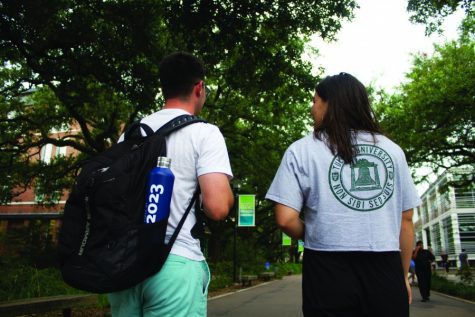Class of 2023 orientation takes step forward in addressing diversity
September 4, 2019
This year’s freshman orientation included a new way to address diversity and inclusion. Community Engagement Advocates, who are recruited through the Center for Public Service and the Carolyn Barber Pierre Center for Intercultural Life at Tulane, led workshops on diversity and inclusion aimed at educating students on their peers’ cultures, circumstances and identities.
“There’s been a lot of push from marginalized populations on campus to include some sort of diversity training because we have these alcohol and sexual assault trainings, which are all extremely important for a first year experience, but we don’t have any sort of training for diversity,” CEA Sonali Chadha said.
Chadha, a senior, does not remember receiving any sort of diversity training when she went through orientation her freshman year. Last year’s orientation did not address the issue of diversity and inclusion so comprehensively, however, this year’s programs seemed to have completely changed.
“I definitely thought it was really inclusive, and it spoke a lot to me about the school, about how far they’re willing to go to make sure everyone felt comfortable here,” freshman Alexis Preston said. “Even coming in, I know a lot of people of color who said they felt out of place, so seeing that they went out of their way to make a program to include diversity and promote that, it made me feel very comfortable being here.”
Students were split up into groups of roughly 20-30 and later on split into even smaller groups of four to discuss each other’s experiences in a more intimate, exclusive setting. This not only allowed students to open up to one another, but also allowed them to understand their peers’ backgrounds so they could better understand their perspectives.

“We did this activity at one of our orientation events where we had to rank ourselves on a piece of paper if we grew up in the suburbs or the city, all of this, and then we all got into small groups to talk about how our experiences are different,” Preston explained.
Takeaways from these new orientation workshops seem to be positive. The workshops’ goal of students becoming more aware of each others’ cultures, backgrounds and experiences seems to have been successful. Instead of remaining ignorant of their privilege, the hope is that students are learning to be aware when they have privilege over another student.
Chadha facilitated two workshops and felt there were rewarding moments.
“I did see moments where students were like, ‘Oh I recognize my privilege here,’ or ‘I see what I could have done wrong in a situation/how I can be more inclusive on campus,’ which to me is really rewarding because that’s what I’m there for,” Chadha said.
Preston realized through the workshops that she was able to connect to people that she didn’t think were similar to her.
“I just think it was very interesting walking in there with a perceived notion that there are certain people I have nothing in common with, but then you find out you both grew up in the suburbs or the city or even just hearing different peoples’ experience,” Preston said.
Tulane’s campus harbors students from all different backgrounds, ethnicities, genders, sexual orientations and identities, and as Chadha said herself, “To me, making Tulane a more inclusive campus is one of my biggest goals while being here.”
Correction: A previous version of this article stated that the Community Engagement Advocates are recruited through the Center for Public Services. Community Engagement Advocates are recruited both through the Center for Public Service and the Carolyn Barber Pierre Center for Intercultural Life.









Leave a Comment